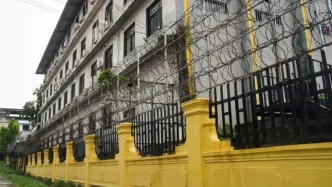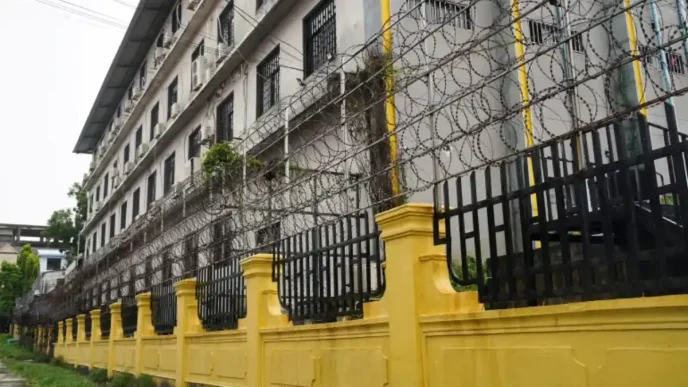Thai Prime Minister Paetongtarn Shinawatra has firmly rejected accusations that her government attempted to buy votes from opposition MPs during a recent no-confidence debate, dismissing the claims as baseless and illogical. Speaking to reporters on March 27, 2025, after a Cabinet meeting in Bangkok, Paetongtarn asserted that her administration had no need to resort to such tactics, given its strong support base within the House of Representatives.
“I don’t know anything [about it]. There was no one paying [for votes]. There’s none. We’d already talked [about the censure vote] with the coalition parties” she told journalists, as reported by local media. Her comments came in response to allegations from a People’s Party MP, Krit Silapachai, who claimed he was offered significant sums of money to support the premier during the critical vote.
Allegations of Bribery Surface
The controversy erupted when Krit, a lawmaker from Rayong province representing the opposition People’s Party, publicly accused an unnamed influential political figure of attempting to sway his vote. On March 26, 2025, Krit shared screenshots of a conversation via the Line messaging app, in which he was allegedly offered 20 million Thai Baht (US$590,000) to vote in favor of Paetongtarn on the eve of the no-confidence debate. Additional incentives reportedly included 5 million Thai Baht (US$147,500) if he were expelled from his party, along with a monthly salary of 250,000 Thai Baht (US$7,375) post-exit. Furthermore, Krit claimed he was promised a ministerial position if he could convince at least 10 other People’s Party MPs to defect to the ruling coalition.
These allegations have stirred significant debate in Thailand’s already polarized political landscape, where accusations of vote-buying and political coercion have long been a contentious issue. However, Paetongtarn expressed skepticism about the evidence presented by Krit, suggesting it might have been fabricated. “Our government already had plenty of votes. If we paid for them, it would have been a waste of money. It doesn’t make sense” she remarked, questioning the logic behind such a move when her administration secured a comfortable victory in the no-confidence vote.
No-Confidence Vote Results
The no-confidence debate, held on March 26, 2025, saw Paetongtarn emerge unscathed, with 319 votes in her favor, 162 against, and seven abstentions. Under Thailand’s Constitution, a prime minister must resign if more than half of the House members—248 out of 493—vote against them. Paetongtarn’s tally fell well short of this threshold, underscoring the strength of her coalition’s grip on power. Notably, at least seven opposition MPs voted in her favor, while no members of the government coalition voted against her, raising further questions about the dynamics at play during the session.
While the vote-buying allegations remain unproven, the crossover of opposition votes has fueled speculation about behind-the-scenes negotiations. Political analysts suggest that such crossovers, though not uncommon in Thai politics, often hint at strategic alliances or inducements, even if no direct evidence of financial transactions emerges.
Political Context and Historical Precedents
Thailand’s political history is replete with instances of alleged vote-buying and political horse-trading, particularly during critical parliamentary sessions like no-confidence debates. The practice, while illegal under Thai electoral laws, has been a persistent undercurrent in the country’s democratic processes, often linked to the complex interplay of patronage networks and regional loyalties. Successive governments, regardless of political affiliation, have faced similar accusations, with varying degrees of substantiation.
Paetongtarn, the youngest daughter of former Prime Minister Thaksin Shinawatra, assumed office amid heightened scrutiny due to her family’s controversial political legacy. Thaksin, ousted in a 2006 military coup, remains a polarizing figure, with his influence often cited as a driving force behind the Pheu Thai Party, which Paetongtarn now leads. Critics argue that her administration’s policies and political maneuvers are shaped by this legacy, while supporters maintain that she represents a fresh, pragmatic approach to governance.
The current allegations against her government echo past controversies surrounding the Shinawatra family, though no concrete evidence has yet surfaced to corroborate Krit’s claims. The opacity of Thailand’s political dealings, coupled with the difficulty of verifying private communications like the Line chat screenshots, complicates efforts to ascertain the truth. If confirmed, such actions would violate Thailand’s strict anti-corruption and electoral laws, potentially triggering investigations by bodies like the Election Commission or the National Anti-Corruption Commission.
Public and Political Reactions
The allegations have sparked mixed reactions among the Thai public and political commentators. On social media platforms like X, opinions are sharply divided, with some users condemning the alleged vote-buying as a betrayal of democratic principles, while others question the credibility of Krit’s evidence. Posts from political observers highlight the need for transparency, with one user noting, “Screenshots can be edited. We need more than this to believe such serious claims.”
The People’s Party, a progressive opposition group formed in the wake of the 2020 youth-led protests, has positioned itself as a champion of democratic reform and anti-corruption. Krit’s accusations align with the party’s broader narrative of exposing systemic flaws in Thailand’s political establishment. However, without corroborating evidence or testimony from other MPs, the claims risk being dismissed as political theater designed to discredit the ruling coalition.
Meanwhile, Paetongtarn’s dismissal of the accusations as illogical has drawn criticism from some quarters for appearing flippant. Political analyst Thitinan Pongsudhirak, based at Chulalongkorn University, noted that while the premier’s confidence in her coalition’s numbers may be justified, her response could be perceived as downplaying the gravity of vote-buying allegations—a perennial concern in Thai politics. “Even if no money changed hands, the perception of impropriety can erode public trust” Thitinan observed in a recent interview with a local outlet.
Legal and Ethical Implications
Under Thailand’s legal framework, vote-buying is a serious offense, punishable by imprisonment and fines. The Computer Crime Act B.E. 2550 also imposes penalties for the dissemination of false information online, raising questions about the legal ramifications of Krit’s decision to publicize the alleged chat screenshots without revealing the identity of the other party. If the evidence is deemed fabricated, Krit could face charges; conversely, if substantiated, the allegations could trigger a broader probe into the government’s conduct.
Ethically, the incident underscores the challenges of maintaining integrity in a political system where personal and financial incentives often intersect with public duty. For international observers, including organizations monitoring democratic practices in Southeast Asia, the situation serves as a reminder of the structural hurdles Thailand faces in consolidating its democracy following years of military rule and political instability.
Broader Regional Implications
Thailand’s political dramas often resonate beyond its borders, given the country’s role as a key player in ASEAN and a hub for regional economic and diplomatic activity. Allegations of vote-buying, if left unaddressed, could tarnish Thailand’s image as a stable democracy, potentially affecting investor confidence and diplomatic relations. Neighboring countries like Vietnam and Cambodia, which grapple with their own governance challenges, may view Thailand’s struggles as a cautionary tale—or, conversely, as justification for tighter state control over political processes.
Moreover, the incident highlights the growing role of digital evidence in political disputes across Southeast Asia. Screenshots, audio recordings, and other forms of online content are increasingly used to expose alleged misconduct, but their authenticity remains difficult to verify without forensic analysis. This trend poses both opportunities and risks for accountability in the region’s political spheres.
Looking Ahead
As the dust settles from the no-confidence debate, questions linger about the veracity of the vote-buying allegations and their potential impact on Paetongtarn’s administration. While her government appears secure for now, sustained public skepticism or further revelations could test the coalition’s unity. For the People’s Party, the incident offers a chance to rally support around anti-corruption reforms, though it must navigate the risk of overplaying its hand without solid proof.
In a political environment as fractious as Thailand’s, where trust in institutions remains fragile, every accusation carries weight—whether substantiated or not. For now, Paetongtarn’s assertion that her government has no need for illicit tactics stands as her defense, but the court of public opinion may prove less forgiving than the House vote.














